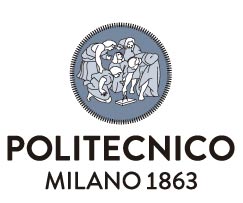
Founded in 1863, Politecnico di Milano (PoliMi) is a state scientific-technological university, which trains engineers, architects and industrial designers. PoliMi activity is characterized by the combination of theoretical bases of excellence and first-rate research infrastructures. Currently more than 41000 students are enrolled, in 7 different campuses, in PoliMi education programs, at bachelor, master and PhD levels, instructed by more than 1300 faculty members. In the field of Civil and Structural Engineering, PoliMi was ranked 14th in the world in the last QS World University Ranking, thus resulting 5th in Europe, 1st in Italy. PoliMi is organized in 12 Departments, encompassing all the main areas of engineering, architecture and industrial design and has been very active in European research projects since the early programs, with 281 projects (9 ERCs) approved within FP7 (aprox. 90 M€) and 151 projects (17 ERCs) within H2020 (aprox.70 M€).
The group involved in ReSHEALience belongs to the Department of Civil and Environmental Engineering, which employs 102 faculty members, 69 post-doctoral research fellows, 89 PhD students under 2PhD programs, (Structural, Earthquake and Geotechnical Engineering and in Environmental Engineering and Infrastructures), and 44 staff people. The Department performs interdisciplinary research in the fields of theoretical, computational and experimental mechanics of materials and structures, with main focus on concrete and masonry structures, including architectural heritage; engineering seismology and earthquake engineering; geology, soil mechanics and geotechnical engineering; structural diagnosis and retrofitting; hydrology, hydraulic engineering and water science; environmental engineering; geodesy and geomatics; transportation and infrastructure engineering. The PoliMi research group led by the coordinator of the project, with coordination and leadership experience in international projects and consortia, is active in research, teaching and service in the broad fields of concrete and advanced cement based materials, with documented activities and experience covering several aspects of the proposal, as also highlighted below with reference to specific projects and publications. The group has performed top-notch research in the fields of: advanced cement based materials concept and technology; experimental characterization of mechanical properties, also under extreme conditions, including, e.g., earthquake, fire or extreme environmental exposure; material durability, with analysis of degradation processes and of self-healing autogenous and engineered mechanisms; interaction with steel and polymer reinforcement, including corrosion; structural applications and design methods; multi-scale and multi-physics modelling including hydration, fracture, damage and degradation processes; advanced multi-scale characterization of cementitious materials, e.g. computer tomography, also for the identification of self-healing outcomes, and non-destructive characterization of fibre reinforced concrete meso-structures, including fibre dispersion/orientation with electrical resistivity and magnetic inductance based methods. The research activities of the PoliMi group are supported by the facilities of Laboratory for testing Materials, Buildings and Structures, which covers an area of 6500 m2 and is equipped with state of the art equipment. Activities include testing of structures and structural elements, chemical-physical, mechanical testing of building materials environmental engineering, non-destructive monitoring and large scale computing, including parallel. The laboratory is accredited as an Official Laboratory according to the Italian Law n.1086/1971 and the DPR n.380/2001 for the certification testing of construction products. It is a notified Body according to the EU Regulation No 305/2011 for CE marking of construction products. It is also accredited by the national accreditation body ACCREDIA for several tests (LAB 1275-E) and for the calibration of forces (LAT 104) The Laboratory for testing Materials, Buildings and Structures encompasses several areas. With specific reference to concrete materials and structures equipment for a wide range of laboratory and on site experimental tests are available, from mechanical characterization of material to verification of the behaviour of simple structures and structural elements. These include also advanced cement based materials, such as high performance, fibre reinforced, light-weight and self-compacting concrete, both in the fresh (rheology) and hardened state, including extreme conditions such as durability and fire behaviour. With reference to mechanical (hardened state) testing of concrete materials and structures, the laboratory is equipped with test apparatus and measuring instruments for mechanical testing with maximum forces ranging from as low as 0.01 N (for testing soft materials and/or cement based materials in the fresh state/green strength) and up to 5000 kN (strong floor – vertical load) and with a reaction frame able to counteract up to 500 kN horizontal load, under contemporary applied vertical load up to 2500 kN. As for durability testing, equipment is available to test the material/element performance under: freeze and thaw cycles, thermal shock; salt spray tests (for the evaluation of corrosion of metallic materials); artificial rain on wall samples; salt crystallization, UV rays aging. Microstructural characterization of material can rely upon equipment for Mercure Intrusion Porosimetry, X-ray diffraction, thermo-gravimetry analysis, SEM observations and X-ray computed tomography.
PIAZZA LEONARDO DA VINCI,
20133 - MILANO
ITALY
Liberato Ferrara
Associate professor
Civil and Environmental Engineering department

